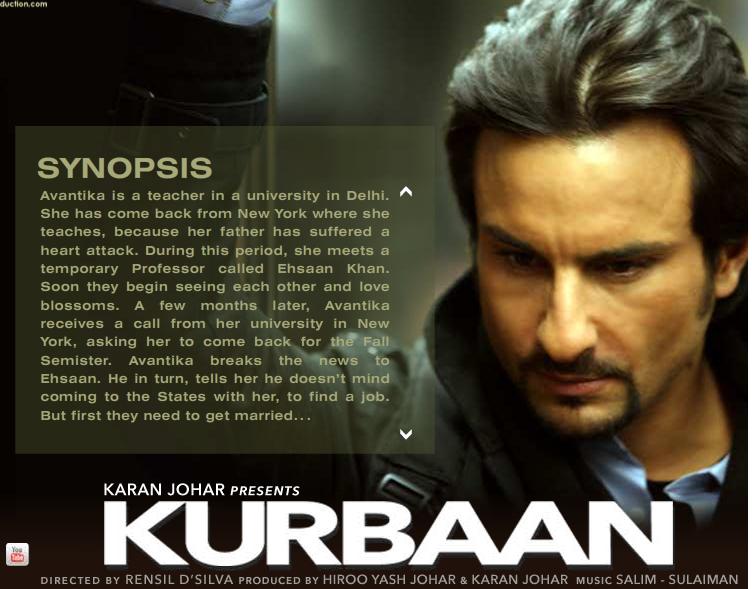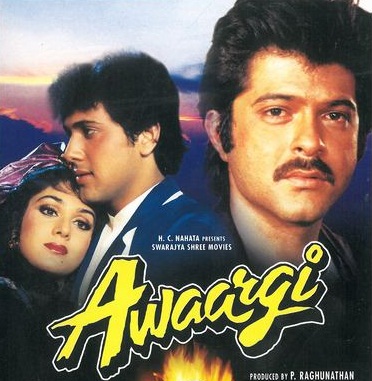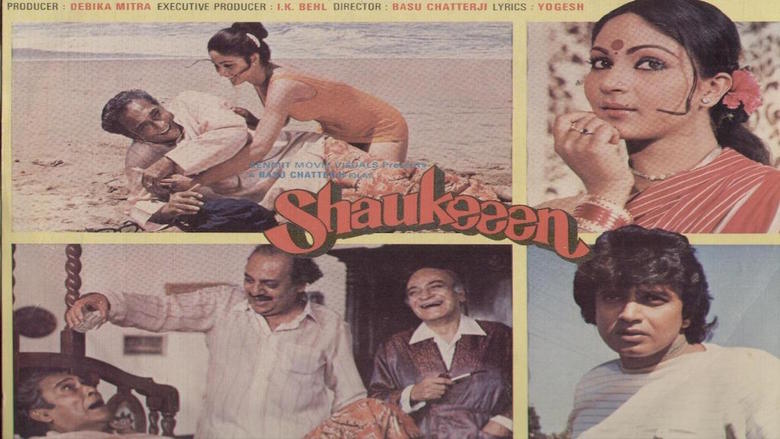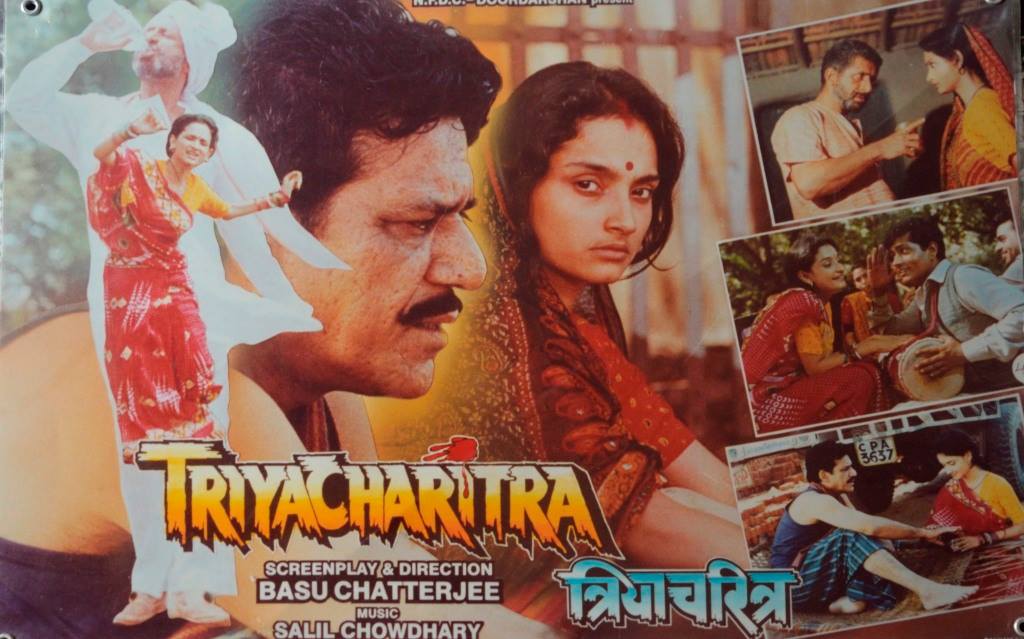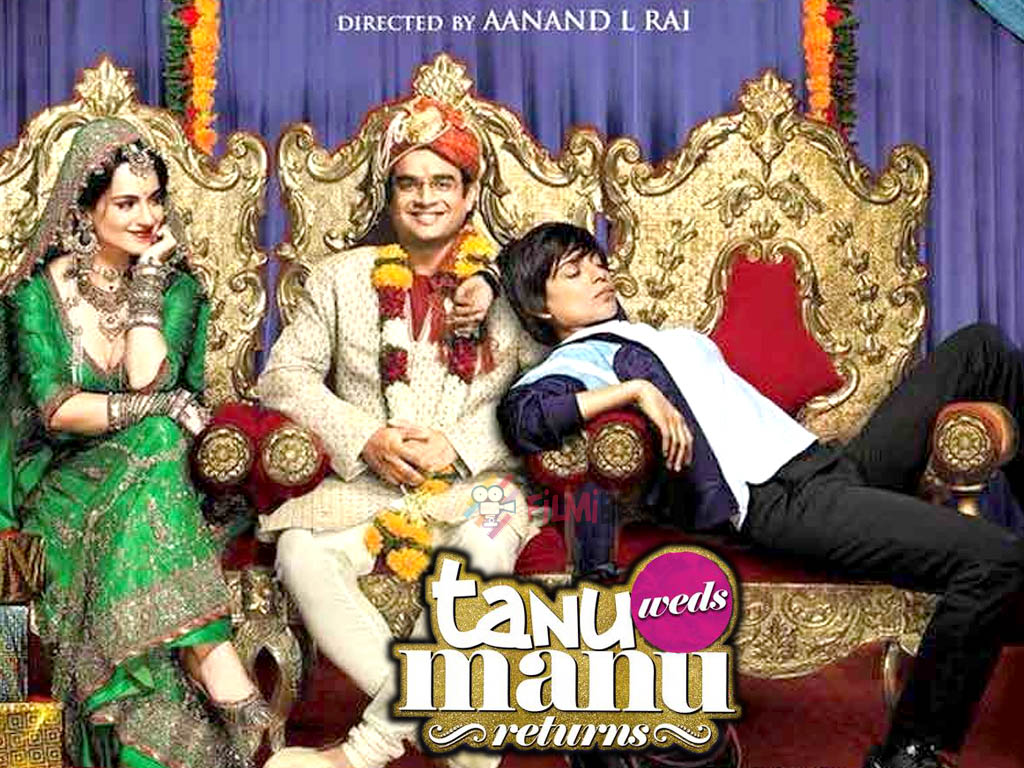The opening credits with flashing images of wires, electronic devices, detonators and a swinging yellow bulb in a dingy workshop supported by thumping musical beats for a background score set the pace of the movie right at the onset and prepare the viewer for the gory things to come. The credits end with the dying glow of the bulb’s filament that soon sinks into visual non-existence leaving cold, deathly darkness behind hinting at the sad and perplexing reality of our violent times.
Taut narrative, competent performances, careful directorial handling and sleek packaging has ensured that the final product is worth more than a watch. However, the real strength of Kurbaan lies in its uncompromising approach to its material. It does not shy away from projecting the coarse truth of Islamic fundamentalism and what it has come to mean in the modern times, particularly in the post-9/11 era.
The movie opens on a sunny winter day at a bright India Gate, where Saif and Kareena are trying to hire a taxi each. Saif waves, a taxi stops, and the same old story of one taxi, two people with no concept of sharing follows. Kareena forces her way into the taxi and Saif pretends to be sick to get the taxi back with outsmarted Kareena left behind, fuming. But it turns out that they had the same destination, as they are ‘professors’ in the same college. Very predictably, Saif apologizes and then coffees follow at the CCDs (“A lot can happen over a coffee”). Quite a lot happens, and a bit of it spills over into college staffroom, too. Library too, I faintly recollect, finds its share of romance. Kareena is from New York and had come to India on account of her father’s failing health. With the betterment in her father’s health and an offer from the educational institution she had been working for earlier, the prospects of her return to New York is all too real. Death of a robust romance is, thus, imminent unless one of the two values the relationship enough to let go of his or her personal ambitions to some extent. Saif is man enough to happily volunteer. Next comes the marriage question, and Hindu-Muslim issue comes to the fore, but is promptly resolved.
 Avantika Ahuja (Kareena) marries Ehsaan (Saif) to become Avantika Khan and the couple head to New York to start a new life. They find a house in an Indian neighbourhood, Ehsaan lands a lectureship position and just when it seems that the happily-ever-after has arrived, the neighbours invite the couple over for dinner. One thing follows another and the day Avantika learns of her pregnancy, destiny delivers a heartbreaking shocker. She learns that her husband had used her as a tool to get into the United States legitimately, and that she had been an instrument right from the beginning, which also meant that the ‘loving Ehsaan’ was a mask to cover the cold face of a dreaded assassin. The family in the neighbourhood that the couple gets close to is a sleeping cell of a terrorist network, which Ehsaan is an integral part of.
Avantika Ahuja (Kareena) marries Ehsaan (Saif) to become Avantika Khan and the couple head to New York to start a new life. They find a house in an Indian neighbourhood, Ehsaan lands a lectureship position and just when it seems that the happily-ever-after has arrived, the neighbours invite the couple over for dinner. One thing follows another and the day Avantika learns of her pregnancy, destiny delivers a heartbreaking shocker. She learns that her husband had used her as a tool to get into the United States legitimately, and that she had been an instrument right from the beginning, which also meant that the ‘loving Ehsaan’ was a mask to cover the cold face of a dreaded assassin. The family in the neighbourhood that the couple gets close to is a sleeping cell of a terrorist network, which Ehsaan is an integral part of.
Like any woman in her situation, she feels betrayed and used by none other than the one she loved and trusted, and the one whose love she treasured the most. What’s even more shattering is that the love was nothing more than a long-standing, consistent fraud through and through.
Besides being torn by an acute sense of betrayal, Avantika (Kareena) also comes face to face with the merciless world of terrorism, where Jehad is the only meaningful word. Of course, she sees no justification for blowing the innocents to bits, and is determined to have the terrorist cell neutralized. Her clear disapproval of their objective and ways is too blatant to escape notice. The leader of the group, Bhaijaan (brilliantly played by Om Puri) sees her as too great a risk to be kept alive and ticking, but Ehsaan wouldn’t allow any harm to her. Obviously, to Ehsaan Avantika is more than just the means to an end, for one doesn’t get that protective about a mere instrument. Ehsaan, on the other hand, is all of a sudden an alien to Avantika.
He is a dreaded assassin well trained in armed and unarmed combats, is well versed with the use of explosives and has been sent to be a part of a sleeper cell in the US, we are informed through the discussions in the FBI war room.
Therefore, the movie deals thenceforth deals with two conflicts. One is at the personal level of the protagonist while the other one is the larger, general conflict between two violent sides – the terrorists and the State.
The problem with using force – no matter how legitimate and justified – is that it tends not only to destroy and disperse but also to unite and concretize. Terrorism is not a movement or objective. It’s a tool. Therefore, all kinds of terrorism are alike. It, thus, follows that each kind has its own remedy. The force being used against terrorism is massive, which is also working to unite the terrorists in the same proportion because using bloodshed to stop bloodshed is like using petrol to extinguish fire.
The legitimacy of war against terrorism flows from its objective to protect innocent lives. If anti-terror operations start resulting in the loss of innocent lives on the other side, the legitimacy would naturally wither away. If ‘collateral damage’ is pleaded in defence of such loss of lives, the same can be an equally reliable defence for the terrorists as well, for they could also argue that they are fighting the State and its policies, and the innocent lives lost is ‘collateral damage’.
 The father of Riyaz (Vivek Oberoi) – played by Kubhushan Kharbanda – asks as to how come being loyal to one’s religion was wrong or questionable. He is actually asking if it is right for the Americans to protect their people and their interests through force and violence, how is it wrong for the Muslims to protect their people and their interests through the same means? And innocent lives are being lost on both sides.
The father of Riyaz (Vivek Oberoi) – played by Kubhushan Kharbanda – asks as to how come being loyal to one’s religion was wrong or questionable. He is actually asking if it is right for the Americans to protect their people and their interests through force and violence, how is it wrong for the Muslims to protect their people and their interests through the same means? And innocent lives are being lost on both sides.
Furthermore, it is the democratically elected US government that wreaked havoc in Iraq and Afghanistan. So, it is technically carrying out the wishes of the American people. How, then, is a common American completely innocent, even if not completely guilty? On the other hand, Osama Bin Laden and Saddam Hussein were not elected representatives of the people. So, a common Iraqi or a common Afghan is more innocent than a common American.
Besides, as a matter of fact Iraq was invaded without provocation, and the civilian body count so far stands somewhere between 94,554 and 103,162. How do we explain that?
These are tough questions and there are no easy answers. But these so-called ‘Islamic terrorists’ are the children of these unanswered questions. IRA and LTTE fall within the description of terrorist organizations, but the likes of Al Qaeda are different and far more dangerous monsters altogether. We can only ignore the truth and the hard questions at our own peril.
Originally written for and published in LAWYERS UPDATE [January 2010 Issue; Vol. XVI, Part 1]

